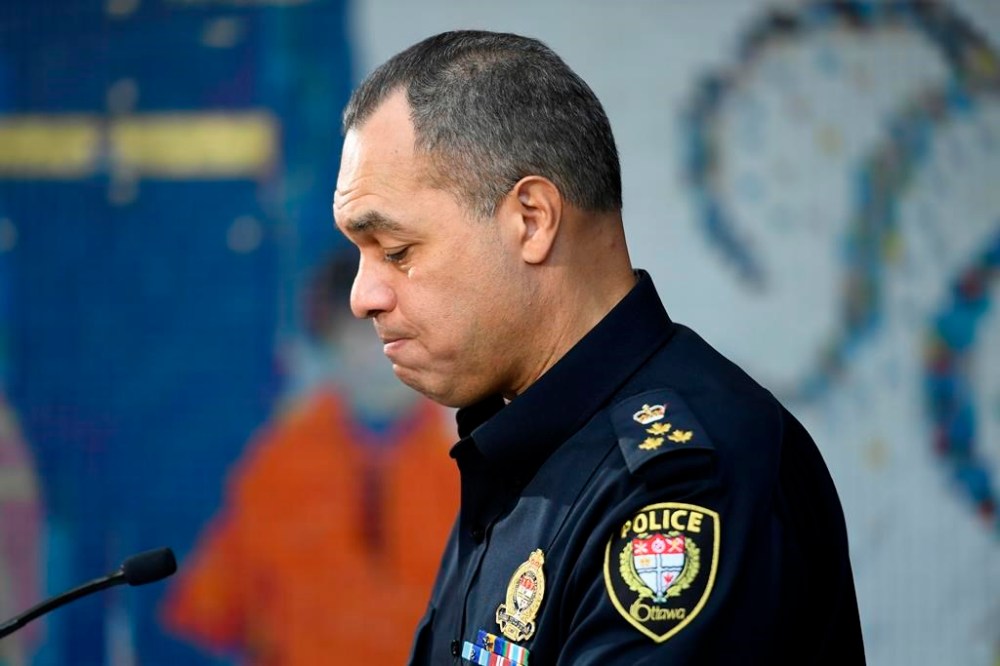Ex-Ottawa police chief says force couldn’t change much about response to convoy
Advertisement
Read this article for free:
or
Already have an account? Log in here »
To continue reading, please subscribe:
Monthly Digital Subscription
$0 for the first 4 weeks*
- Enjoy unlimited reading on winnipegfreepress.com
- Read the E-Edition, our digital replica newspaper
- Access News Break, our award-winning app
- Play interactive puzzles
*No charge for 4 weeks then price increases to the regular rate of $19.00 plus GST every four weeks. Offer available to new and qualified returning subscribers only. Cancel any time.
Monthly Digital Subscription
$4.75/week*
- Enjoy unlimited reading on winnipegfreepress.com
- Read the E-Edition, our digital replica newspaper
- Access News Break, our award-winning app
- Play interactive puzzles
*Billed as $19 plus GST every four weeks. Cancel any time.
To continue reading, please subscribe:
Add Free Press access to your Brandon Sun subscription for only an additional
$1 for the first 4 weeks*
*Your next subscription payment will increase by $1.00 and you will be charged $16.99 plus GST for four weeks. After four weeks, your payment will increase to $23.99 plus GST every four weeks.
Read unlimited articles for free today:
or
Already have an account? Log in here »
Hey there, time traveller!
This article was published 26/10/2022 (1143 days ago), so information in it may no longer be current.
OTTAWA – The former chief of the Ottawa police says his officers couldn’t have done anything materially differently during the response to the “Freedom Convoy.”
A summary report of an interview with Peter Sloly has been submitted as evidence at the public inquiry investigating the federal government’s unprecedented use of the Emergencies Act in February.
Much of what is found in the 61-page interview summary differs from what the inquiry has heard from other police officers so far.

“Chief Sloly does not believe that OPS could have done anything materially differently on a big-picture level given the unprecedented national security crisis,” the summary said.
The Emergencies Act, which was invoked Feb. 14, granted temporary and extraordinary powers to police, banks and governments to end the demonstrations.
The Public Order Emergency Commission is tasked with investigating the Trudeau government’s decision to invoke the act. Its mandate also includes exploring what happened when protesters took over several streets around Parliament Hill for more than three weeks, and what was done to end the demonstrations.
Sloly told commission lawyers that he was operating in the midst of turmoil within Ottawa police ranks, the police services board and city council as public pressure was mounting to end the demonstrations.
The commission has heard a great deal about that turmoil over 10 days of public hearings. Previous witnesses, including senior officers from the Ontario Provincial Police, have testified there was a lack of informed intelligence in the early days of the protest.
Steve Bell and Patricia Ferguson, who were Ottawa police deputy chiefs in February, also told the commission there was disorganization and confusion within the force’s command structure.
Sloly said the gaps in intelligence ahead of the protest show there is an excessive focus on Islamic extremism in Canada’s national security strategy at the expense of other threats.
Based on intelligence reports, he said he understood “Freedom Convoy” protesters’ intent shifted from an initial focus on ending federal vaccine mandates to include competing messages, including calls to overthrow the federal government or repeal laws.
An OPP intelligence unit was producing reports at the time warning the protesters could be staying long-term. One such report, submitted as evidence as part of the inquiry, flagged the “Freedom Convoy” as “high risk” for traffic disruptions and illegal activity.
Sloly said in the interview that he didn’t have any sense the occupation would last for months and would be able to defeat Ottawa police’s capabilities. He told commission staff deputy chief Bell did not brief him on the protest’s potential to be a national security crisis.
Bell, who is now interim chief, testified Monday that police expected the protesters to be peaceful and leave after three days — but that’s not what happened. He said the police did not properly prepare for the effect the demonstrations would have on local residents.
The former chief resigned on Feb. 15, a day after the Emergencies Act was invoked, citing a “growing lack of confidence” in his leadership, and a lack of trust in his work leading to a lag in resources arriving.
Sloly is set to testify in public hearings in Ottawa on Friday.
This report by The Canadian Press was first published Oct. 26, 2022.





